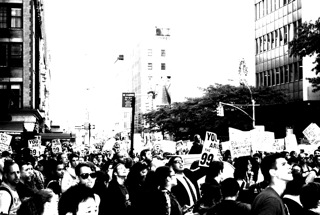Click here to read. This dossier takes its cue from one of the Occupy movement’s bedrock slogans, “This Is What Democracy Looks Like” (though this was first nurtured, as were many Occupy paradigms, tactics and customs, in the global justice movement that came of age in Seattle in 1999). This proud assertion, stiffened by populist certitudes about the 99% hyper-majority, exercised a clear appeal to protesters. It is self-congratulatory, confrontational, and also quite articulate as a political statement. Not everyone has to believe the slogan to chant it. But what if it were taken up as a more literal goal? What if the Occupy model of horizontalism were to be pushed into every venue of civil society, eventually supplanting the roots of our representative democracy system? Who would stand to gain and who would lose? How would our own institutions, organizations and networks be transformed in the process? The radical innocence of Occupy allowed such questions to be asked. After a year of operations, the record allows some provisional answers to be offered. Read More …Table of Contents
- Introduction: Is This What Democracy Looks Like
Cristina Beltrán, A.J. Bauer, Rana Jaleel, and Andrew Ross - Their Fight Is Our Fight: Occupy Wall Street, the Arab Spring, and New Modes of Solidarity Today
Anthony C. Alessandrini - This is What Democracy Feels Like: Tea Parties, Occupations and the Crisis of State Legitimacy
A.J. Bauer - Occupy’s Alliance With Labor
Suzanne Collado - Occupy Wall Street and Consensus Decision Making: Historicizing the Preoccupation With Process
Andrew Cornell - A Queer Home in the Midst of a Movement? Occupy Homes, Occupy Homemaking
Rana Jaleel - For Democracy, Strike Debt: Resonances of Abolition in the Occupy Movement
Nicholas Mirzoeff - The Islamic Republic of Iran Loves OWS: Is This What Solidarity Looks Like?
Manijeh Nasrabadi - The Question of Infrastructure: An Interview with Michael Ralph
A.J. Bauer - Democracy and Debt
Andrew Ross - Policing Political Protest: Paradoxes of the Age of Austerity
Stuart Schrader - Not Your Academy: Occupation and the Futures of Student Struggles
Zach Schwartz-Weinstein


